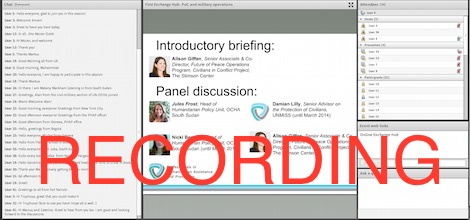On Thursday, 29 January 2015, PHAP hosted its First Exchange Hub online event. It provided members of the association with the opportunity to interactively engage with current topics in humanitarian affairs through online discussions and to learn from the experiences and expertise of other humanitarian practitioners. Two weeks of discussion culminated in this online event.
The discussion was introduced with a special briefing from Alison Giffen, Senior Associate & Co-Director, Future of Peace Operations Program, Civilians in Conflict Project, The Stimson Center. The briefing was followed by a panel discussion on the overarching questions on the topic and the case of South Sudan with Jules Frost, the Senior Advisor for Civil-Military & Police Relations for World Vision International; Nicki Bennett, Head of Humanitarian Policy Unit at OCHA South Sudan; and Damian Lilly, who was Senior Advisor on the Protection of Civilians for UNMISS until March 2014.

Click here to watch the recording
Click here to download the event report
Protection of civilians (PoC) has been widely agreed by humanitarian actors to encompass “all activities aimed at obtaining full respect for the rights of the individual in accordance with the letter and spirit of the relevant bodies of law (i.e., IHRL, IHL and refugee law).” The concept is rooted in the law of armed conflict, under which belligerents have the obligation to protect civilians from the harmful effects of war. When humanitarian actors undertake protection activities in such a context, they undertake primarily to prevent or cease violations by the parties to the conflict. In practice, the scope of activities that this entails has been evolving over time and also varies by agency – with an increasing number of humanitarian organizations including protection in their programming. At the same time, over the course of the last 15 years, PoC has also increasingly been included in the mandates of UN peacekeeping missions and other military forces – in South Sudan, CAR, Libya, Afghanistan, and elsewhere – where humanitarian organizations are also active. This raises a number of important questions:
- How can/ should peacekeeping missions balance PoC aims among their other mandated priorities, all of which compete for scarce resources and some of which may even conflict with each other? What does a focused and effective protection of civilians strategy for a peacekeeping operation look like in practice?
- How can/ should peacekeeping missions and humanitarian actors pursuing PoC objectives in the same context relate to each other?
- In the context of pursuing PoC objectives, what are the relative strengths and weaknesses of military and humanitarian actors?
- In an armed conflict situation, if there is a peacekeeping actor with a “robust” PoC mandate, how should humanitarian actors approach coordination with the peacekeeping mission? Do regular civil-military guidelines apply? Or does the PoC mandate of the mission make it a special case?
- In what situations is cooperation and/ or coordination with PoC-mandated military actors not compatible with a principled approach to humanitarian action?
- Why do humanitarian actors not adhere consistently to established guidelines and basic principles for civil-military coordination? Is it because of a lack of clarity or appropriateness of the guidance, a lack of awareness, or competing priorities?
- In what ways, concretely, could more effective civil-military coordination support improve humanitarian outcomes for affected populations?
The Exchange Hub online events are only open to members of PHAP, the only sector-wide professional association of individuals engaged in humanitarian assistance and protection worldwide. You can read more about membership and apply at phap.org/membership.